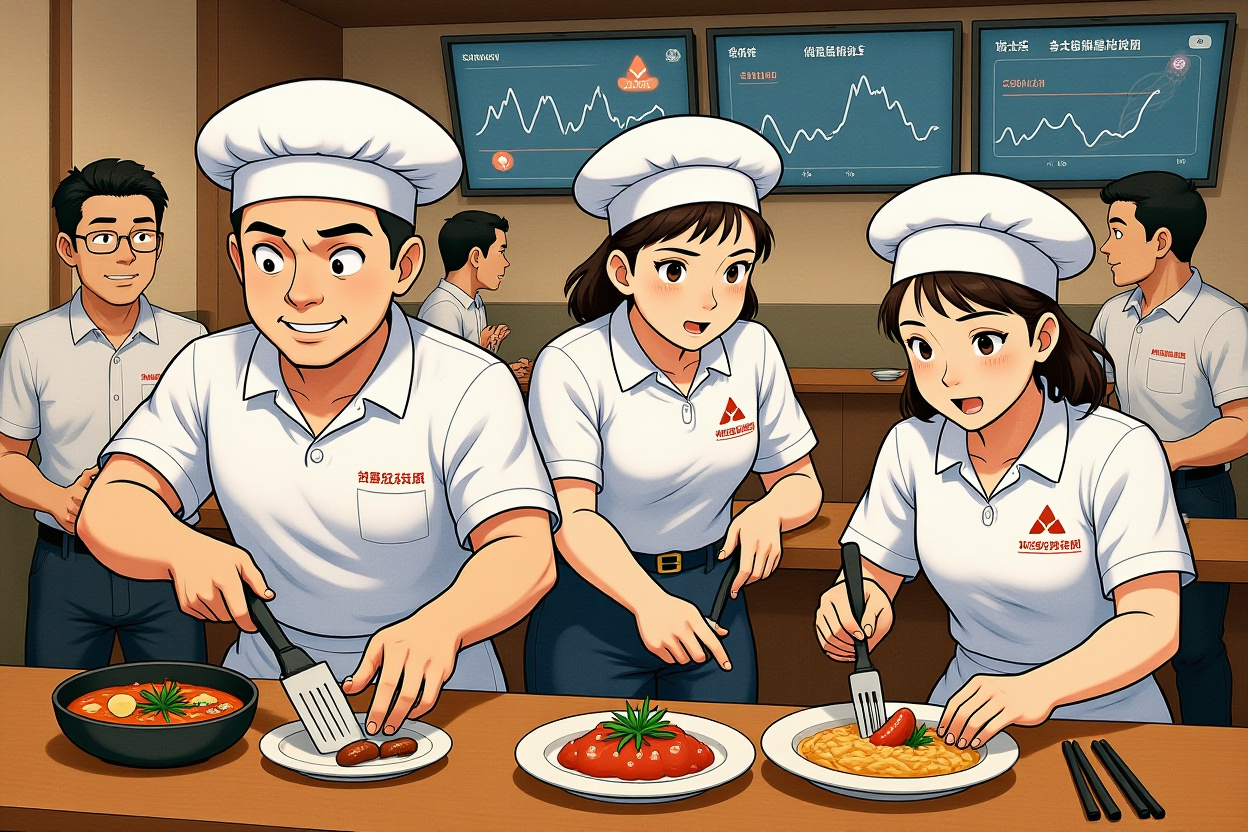Xi Bei’s Latest Kitchen Hygiene Incident Draws Public Outcry
Xi Bei, a prominent Chinese restaurant chain, is facing renewed public and investor scrutiny after videos surfaced showing kitchen staff using a stainless-steel strainer to unclog a drain. The incident comes amid ongoing debates over the company’s use of pre-made dishes (预制菜), further eroding consumer trust at a time when food safety is under the microscope.
Multiple media outlets conducted live-streamed inspections of Xi Bei kitchens across several Chinese cities, revealing operational practices that have sparked widespread concern. In one clip, an employee was seen using an unlabeled strainer to clear a blocked drain, while another video showed a similar utensil placed in a cooking pot near the same drain area.
Immediate Fallout and Corporate Response
On September 14, Xi Bei’s customer service team issued a statement acknowledging the video and confirming an internal investigation is underway. The company emphasized that according to its hygiene protocols, each outlet should have a dedicated, clearly labeled tool for drain cleaning—strictly separated from food preparation utensils.
A store manager from a Xi Bei location in Xi’an provided additional context, explaining that a specialized cylindrical cup is typically used to clear food debris from sink filters in the dishwashing area. However, the apparent misuse of a strainer—a food preparation tool—has raised alarming questions about cross-contamination risks and operational oversight.
Broader Implications for Xi Bei and the Food Service Sector
This incident could not have come at a worse time for Xi Bei. The chain is still grappling with consumer skepticism toward pre-made dishes—pre-prepared meals that require minimal finishing in the kitchen. While such dishes can enhance efficiency and consistency, they have faced criticism over taste, nutritional value, and now—as this event highlights—kitchen hygiene.
Market Reaction and Investor Concerns
News of the incident spread rapidly across social media and financial news platforms, triggering discussions among investors about operational governance and brand risk. For a company that has positioned itself at the premium end of China’s casual dining market, repeated hygiene-related controversies could impair customer loyalty and same-store sales growth.
– Stock performance: Xi Bei’s parent company, XIBEI Catering, has yet to release a formal market announcement, but industry analysts are monitoring the situation closely for any impact on valuation or franchisee confidence.
– Sector-wide impact: The incident may prompt tighter regulatory scrutiny of kitchen practices across China’s food and beverage industry, particularly for chains that rely on pre-made dishes.
Xi Bei’s Crisis Management and Transparency Measures
In response to the growing criticism, Xi Bei announced on September 12 that it would allow customers to visit the kitchens of all 370+ outlets across China. This move is clearly designed to restore confidence through transparency. Additionally, the chain introduced a new “Luo Yonghao Set Menu”—named after the popular Chinese influencer and businessman—to attract consumers and shift focus toward menu innovation.
Will Opening Kitchens Really Help?
While kitchen tours may reassure some customers, others remain skeptical. Without rigorous and consistent adherence to food safety standards, performative transparency may backfire. The company must demonstrate not only that it can avoid cross-contamination between cleaning tools and food utensils, but also that it enforces strict protocols across all locations.
Regulatory and Industry Context: Food Safety in China
China’s food and beverage sector is no stranger to hygiene-related controversies. From the 2008 milk scandal to more recent incidents involving well-known hotpot and fast-food chains, public sensitivity to food safety remains high. Regulators like the State Administration for Market Regulation (国家市场监督管理总局) have increasingly used digital monitoring, unannounced inspections, and public shaming to enforce compliance.
How Are Pre-Made Dishes Regulated?
Pre-made dishes occupy a regulatory gray area. While they can reduce kitchen workload and standardize quality, they also introduce new risks related to storage, reheating, and handling. The government has been drafting new guidelines for the pre-made dish sector, but the Xi Bei incident shows that existing rules around utensil segregation and hygiene are already being tested.
– Current standards: The National Food Safety Standard for Catering Services (餐饮服务食品安全操作规范) requires strict separation between cleaning and food preparation tools.
– Enforcement challenges: With thousands of outlets operating across the country, ensuring consistent compliance remains difficult even for well-managed chains.
What’s Next for Xi Bei and Its Investors?
For now, Xi Bei’s response will be critical. The company must conduct a thorough internal audit, re-train staff, and possibly reorganize kitchen management protocols to prevent future lapses. How it handles communication with customers, investors, and regulators will influence both its short-term reputation and long-term brand equity.
Investors should monitor:
– Sales data following the incident
– Regulatory actions or fines
– Changes in customer sentiment through reviews and social media
– Whether competitors seize the opportunity to gain market share
Final Thoughts: Trust Is the Main Ingredient
Xi Bei’s strainer incident is more than a single operational failure—it’s a symptom of broader challenges facing China’s food service industry as it balances efficiency, scale, and safety. For chains using pre-made dishes, maintaining transparency and rigorous hygiene practices is non-negotiable. Investors, customers, and regulators will be watching closely to see whether Xi Bei can restore confidence through actions—not just announcements.
Those with exposure to Chinese consumer and catering stocks should review their holdings and consider the potential for increased regulatory scrutiny across the sector. Now is the time to prioritize companies with demonstrably strong food safety cultures and crisis management capabilities.



